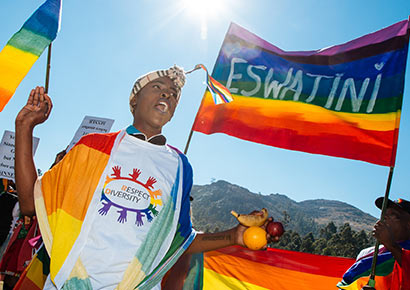Eswatini: Violence infringes on LGBTIQ rights

Pic: All Out / Mathias Wasik / mathiaswasik.com
History was made recently in Eswatini when on the 30th of June 2018 the first ever Eswatini Pride was held. The event has been lauded as a milestone in the quest for LGBTIQ+ visibility in the deeply religious and cultural Kingdom.
Eswatini, like most of African countries, still upholds sodomy laws that criminalise same sex relations and breeds a culture of secrecy for members of the LGBTIQ+ community. The Trans community also experiences further ridicule, discrimination and even death threats. Founder and Director of TransSwati, Lapinty Dludlu, says that at times, members of the Trans community even experience exclusion from fellow members of the LGBTIQ+.
“Many times there is an attack of trans people by fellow gays and lesbians. This makes it difficult to collaborate,” she sadly shares. TransSwati is a trans-led organisation that works in advocacy, human rights and sensitisation. The organisation, according to Dludlu, faces many challenges in the country due to an immense lack of resources including; lack of an office space (as they currently work from home) and retaining staff as there are no funds to pay them. These challenges stifle the efficacy of their work and visibility in the country.
“I still have a bit of trauma,” says 32 year old trans woman, outreach worker and peer educator, Model C*. Her trauma stems from her attack by unidentified men three months ago because she is transgender, “Each time I pass where it all happened I have flashbacks. I got counseling but it wasn’t enough,” she continues.
When she went to the hospital after her attack, Model C* says the treatment she received was horrific. Upon arrival, the nurse on duty told her that she “was not the real person or owner of the file” because her file belonged to someone male and she was presenting as female. After much arguing, she finally saw the doctor, whom she says treated her much better.
Community based organisations in Eswatini are a vital life line in providing health care and counseling services to marginalised populations. Access to health services, especially government provided ones, seems to be a great obstacle facing the Trans community, as government provided services are the site of discrimination, prejudice and exclusion.
“Personally, I prefer community based organisations because we are not discriminated as compared to government facilities,” says Model C*. The denial of gender affirming services at government facilities, forces the Trans community to seek it elsewhere, mostly at pharmacies, where it is extremely costly and many cannot afford it. This is why some of the advocacy work includes sensitisation of health care workers and police officers.”
“Discrimination has been the biggest challenge, gender marker issues, lack of Trans inclusive services and lack of trans specific health care services has left trans people to self-medicate which poses danger,” says Dludlu, “We have been sensitising healthcare workers and police officers in a bid to create a safe space,” she explains.
Dludlu further explains that these difficulties lead to a severe decrease in Trans visibility and under reporting of violence against those identifying as either gay or lesbian becomes easier, “Trans people will then shy away from being who they are because they are being jeered and this forces some to identify as gay or lesbian just because it is better understood by society,” she describes.
The Communication and Advocacy Officer of LGBTIQ+ organisation, Rock of Hope Eswatini, Melusi Simelane says that they urge anyone from the LGBTIQ+ community to report any discrimination they experience, especially by health care providers.
“There is a public health act that says the Ministry of Health must provide healthcare services to all citizens of the country,” he says. Rock of Hope is an umbrella organisation for the LGBTIQ+ community, even though they do not have specifically tailored programmes for the Trans community running currently, the organisation works with TransSwati to document human rights violations. Simelane says these violations can only be addressed via legal remedies but they lack the legal prowess in their organisation.
“The criminalisation of same sex relations is what I find to be the basis of the stigma and discrimination that faces our community in Eswatini,” he explains, “Legally, it is just a common law offense, that states its unnatural for two consenting male adults to conduct sexual activity and it is not on our legislative framework,” says Simelane.
Eswatini is a deeply religious and cultural society which influences the morality of the population. This has led all activists to concur that sensitisation of all spheres of society in the country will hopefully lead to a more accepting society. As it stands, the lives of Trans people in the country remains precarious.
*names have been altered to protect the privacy of sources
Zanta Nkumane is a freelance writer from Swaziland (Eswatini). This article is part of the 16 Days News Service #VoiceandCHoiceCampaign
Leave a Reply